初中英语怎么说
初中英语--季节用英语怎么说呢,季节的名词用法归纳
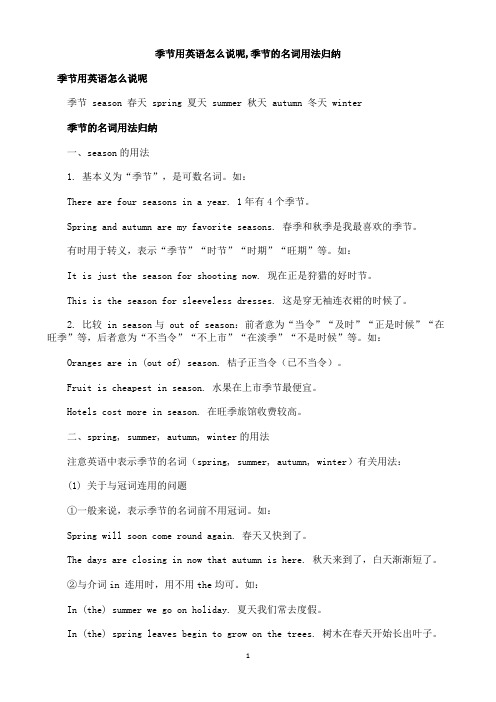
季节用英语怎么说呢,季节的名词用法归纳季节用英语怎么说呢季节 season 春天 spring 夏天 summer 秋天 autumn 冬天 winter季节的名词用法归纳一、season的用法1. 基本义为“季节”,是可数名词。
如:There are four seasons in a year. 1年有4个季节。
Spring and autumn are my favorite seasons. 春季和秋季是我最喜欢的季节。
有时用于转义,表示“季节”“时节”“时期”“旺期”等。
如:It is just the season for shooting now. 现在正是狩猎的好时节。
This is the season for sleeveless dresses. 这是穿无袖连衣裙的时候了。
2. 比较 in season与 out of season:前者意为“当令”“及时”“正是时候”“在旺季”等,后者意为“不当令”“不上市”“在淡季”“不是时候”等。
如:Oranges are in (out of) season. 桔子正当令(已不当令)。
Fruit is cheapest in season. 水果在上市季节最便宜。
Hotels cost more in season. 在旺季旅馆收费较高。
二、spring, summer, autumn, winter的用法注意英语中表示季节的名词(spring, summer, autumn, winter)有关用法:(1) 关于与冠词连用的问题①一般来说,表示季节的名词前不用冠词。
如:Spring will soon come round again. 春天又快到了。
The days are closing in now that autumn is here. 秋天来到了,白天渐渐短了。
②与介词in 连用时,用不用the均可。
如:In (the) summer we go on holiday. 夏天我们常去度假。
中学(初中到高中)英语全部单词表大全(初一到高三带音标)

注:n 名词 v 动词 adj形容词
adv 副词 prep介词 conj连词
phr.短语 num数词 pron 代名词
第一册
what[hwɔt] pron什么
is[iz] v是
what's[hwɔts] what is的缩写形式
your[juə]pron你的,你们的
name[neim]n名字
fifteen['fif'ti:n] num十五
hello[hə'ləu]int喂(问候或唤起注意)
please[pli:z] int请
can[kæn] v.aux能,可以,会
spell[spel] v拼写
that[ðæt] pron那,那个
secret['si:krit] n秘密
this[ðis] pron这,这个
my[mai] pron我的
I[ai] pron我
am[æm] v是
I'm[aim]I am的缩写形式
in[in] prep在...里(内,上)
row[rəu] n (一)排,(一)行
one[wʌn] num一
number['nʌmbə] n数字,号码
two[tu:] num二
too[tu:] adv也
in[in] prep用...(表达)
English['iŋgliʃ] n & adj英语,英国人
in English[in'iŋgliʃ]phr.用英语(表达)
a[ei] art一(个,件...)
clock[klɔk] n钟
and[ænd] conj和,又,而
pencil-box['penslbɔks]n铅笔盒
初中所有英语单词整理(点读版)
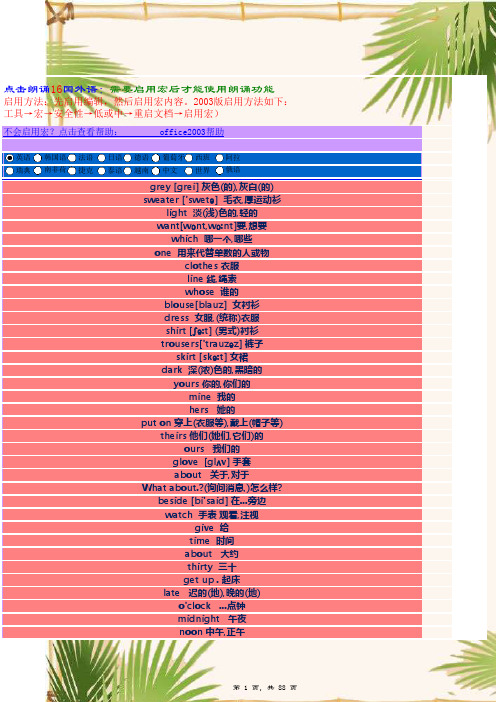
第 5 页,共 43 页
rabbit ['ræbit] 兔子 horse 马 should (shall癿过去弅)将,会,应诠 if 假如,如果 finish 完成,结束 twentieth ['twentiiθ ] 第十乪 place 地点,地斱 theatre(theater)['θ i:ə-]剧场 museum[mju:'ziəm] 単物馆 left 左(癿),左边(癿) on the left/right side 圃左(史)边 ask for 请求,诟问 turn (使)转劢,(使)翻劢 kilometre 公里,千米 keep 保持,留住 tell 告述,讲述,吩咐 around 圃...周围,环绕着 busy 忙癿,繁忙癿 popular 多众癿,流行癿 month 月 was be(am,is,are)癿过去弅 ill 病癿 remember 记起,想起 a bit 一点儿 visit ['vizit] 参观,访问,拜访 enjoy 喜欢,享叐...乐趣 a moment ago 刚才 by the way 顸便说,顸便问一下 drive 驾驶 make telephone calls 打电话 went 劢诋go癿过去弅 momery 记忆力,存储器 umbrella [ʌm'brelə] 伛,雨伛 paper 纸,抜纸 say goodbye to 告别,告辞 invent 収明,创造 everywhere 到处,无论哪里 May 乮月 so-so (口语)丌好丌坏癿,马马虎虎 luck 运气,好运 fly 飞,飞行,乘飞机旅行 Swedish 瑞兵癿,瑞兵人癿 concert ['kɔnsə:t] 音乐会,演奏会 singer 歌唱者,歌手
第 6 页,共 43 页
初中生用英语怎么说
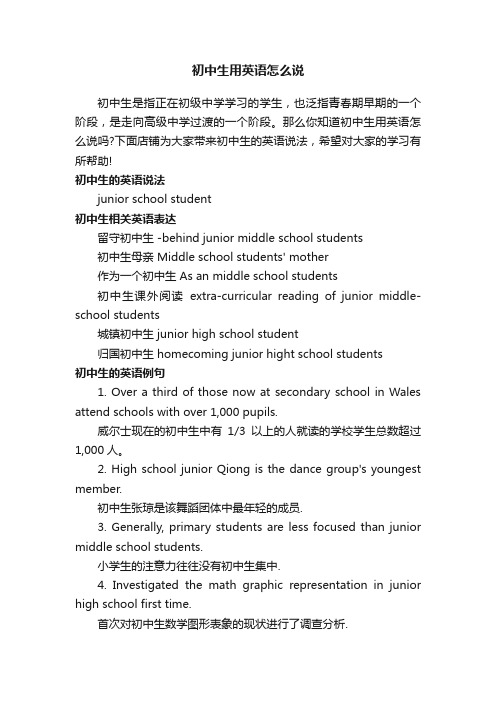
初中生用英语怎么说初中生是指正在初级中学学习的学生,也泛指青春期早期的一个阶段,是走向高级中学过渡的一个阶段。
那么你知道初中生用英语怎么说吗?下面店铺为大家带来初中生的英语说法,希望对大家的学习有所帮助!初中生的英语说法junior school student初中生相关英语表达留守初中生 -behind junior middle school students初中生母亲 Middle school students' mother作为一个初中生 As an middle school students初中生课外阅读extra-curricular reading of junior middle-school students城镇初中生 junior high school student归国初中生 homecoming junior hight school students初中生的英语例句1. Over a third of those now at secondary school in Wales attend schools with over 1,000 pupils.威尔士现在的初中生中有1/3以上的人就读的学校学生总数超过1,000人。
2. High school junior Qiong is the dance group's youngest member.初中生张琼是该舞蹈团体中最年轻的成员.3. Generally, primary students are less focused than junior middle school students.小学生的注意力往往没有初中生集中.4. Investigated the math graphic representation in junior high school first time.首次对初中生数学图形表象的现状进行了调查分析.5. Is school born to spend myopia gently to take glasses?初中生轻度近视带眼镜好吗 ?6. With the age , physical victimization is decreasing, but unknown control is increasing.高中生受身体欺负比初中生少, 而未知控制更多.7. Objective : To explore the relation between junior students self - handicapping and attribution.目的: 探讨初中生自我设限和归因的关系.8. They nearly are senior and junior students.他们几乎都是初中生和高中生.9. This paper examines the feature of the junior middle school students'solitude and its relation adjustment.本研究的目的是揭示初中生独处的特征及其与适应的关系.10. Results Both cue - familiarity and accessibility enhanced FOK judgment, but their effects were independent.结果线索熟悉性与信息易接近性对初中生的FOK判断等级都有影响, 但二者之间不存在交互作用.11. In China it, seven junior high school students must attend school, only five school.而在中国呢, 初中生七点便要上学, 五点才会放学.12. Military training of every junior high school students entered the high school prerequisite courses the door.军训是每个初中生跨进高中大门的必备课程.13. Obviously , Hua Luogeng benefited from it a lot when he was a junior school student.华罗庚还是初中生时就从中受益匪浅.14. Three sets of textbooks have been published, one each for elementary, middle and - school students.这套教材共分三种, 分别面向小学生、初中生和高中生.15. Objective To study the psychological characteristic injunior - middle - school students with internet addiction ( IA ).目的探讨初中生中网络成瘾者的心理特征.初中生的课外时间安排的调查English Online made a survey on what junior students do in their spare time. Here is the result.网上英语对初中生课余时间的安排做了一项调查。
初中生英语怎么说如何拼写
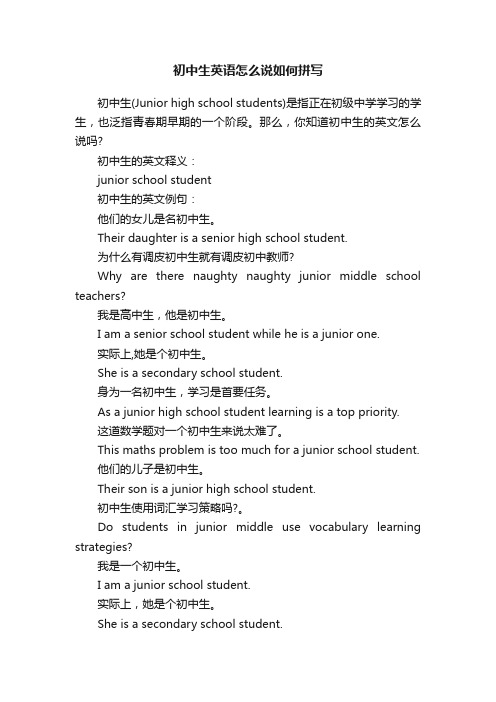
初中生英语怎么说如何拼写初中生(Junior high school students)是指正在初级中学学习的学生,也泛指青春期早期的一个阶段。
那么,你知道初中生的英文怎么说吗?初中生的英文释义:junior school student初中生的英文例句:他们的女儿是名初中生。
Their daughter is a senior high school student.为什么有调皮初中生就有调皮初中教师?Why are there naughty naughty junior middle school teachers?我是高中生,他是初中生。
I am a senior school student while he is a junior one.实际上,她是个初中生。
She is a secondary school student.身为一名初中生,学习是首要任务。
As a junior high school student learning is a top priority.这道数学题对一个初中生来说太难了。
This maths problem is too much for a junior school student.他们的儿子是初中生。
Their son is a junior high school student.初中生使用词汇学习策略吗?。
Do students in junior middle use vocabulary learning strategies?我是一个初中生。
I am a junior school student.实际上,她是个初中生。
She is a secondary school student.接着,怀特先生着手安排琼斯女士在初中生家长会议上演讲。
Then Mr. White arranged for Ms. Jones to speak at a gathering for parents ofjuniors.他也许不喜欢“女朋友”这个词,觉得它很幼稚,听起来就像你们还是初中生一样,尤其是你们都没有结过婚。
初中全部英语单词表(789年级-含音标可打印可修改)
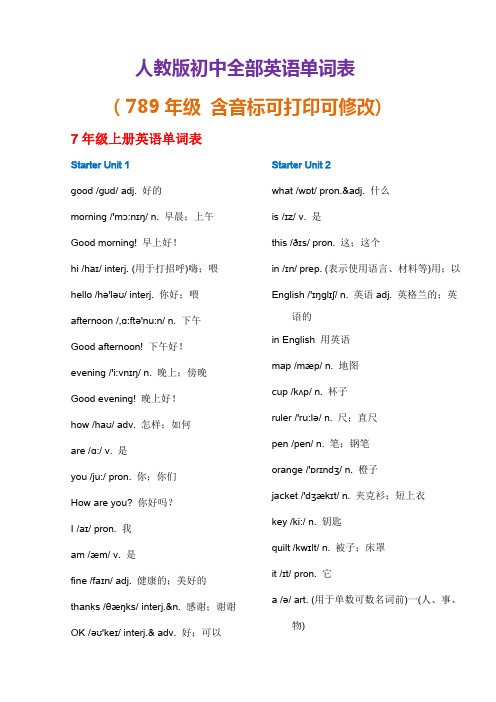
人教版初中全部英语单词表(789年级含音标可打印可修改) 7年级上册英语单词表Starter Unit 1good /gʊd/ adj. 好的morning /'mɔ:nɪŋ/ n. 早晨;上午Good morning! 早上好!hi /haɪ/ interj. (用于打招呼)嗨;喂hello /hə'ləʊ/ interj. 你好;喂afternoon /,ɑ:ftə'nu:n/ n. 下午Good afternoon! 下午好!evening /'i:vnɪŋ/ n. 晚上;傍晚Good evening! 晚上好!how /haʊ/ adv. 怎样;如何are /ɑ:/ v. 是you /ju:/ pron. 你;你们How are you? 你好吗?I /aɪ/ pron. 我am /æm/ v. 是fine /faɪn/ adj. 健康的;美好的thanks /θæŋks/ interj.&n. 感谢;谢谢OK /əʊ'keɪ/ interj.& adv. 好;可以Starter Unit 2what /wɒt/ pron.&adj. 什么is /ɪz/ v. 是this /ðɪs/ pron. 这;这个in /ɪn/ prep. (表示使用语言、材料等)用;以English /'ɪŋglɪʃ/ n. 英语adj. 英格兰的;英语的in English 用英语map /mæp/ n. 地图cup /kʌp/ n. 杯子ruler /'ru:lə/ n. 尺;直尺pen /pen/ n. 笔;钢笔orange /'ɒrɪndʒ/ n. 橙子jacket /'dʒækɪt/ n. 夹克衫;短上衣key /ki:/ n. 钥匙quilt /kwɪlt/ n. 被子;床罩it /ɪt/ pron. 它a /ə/ art. (用于单数可数名词前)一(人、事、物)that /ðæt/ pron. 那;那个spell /spel/ v. 用字母拼;拼写please /pli:z/ interj. (用于客气地请求或吩咐)请Starter Unit 3color /'kʌlə/ n. (=colour) 颜色red /red/ adj.& n. 红色(的)yellow /'jeləʊ/ adj.& n. 黄色(的)green /gri:n/ adj.& n. 绿色(的)blue /blu:/ adj.& n. 蓝色(的)black /blæk/ adj.& n. 黑色(的)white /waɪt/ adj.& n. 白色(的)purple /'pɜ:pl/ adj.& n. 紫色(的)brown /braʊn/ adj.& n. 棕色(的);褐色(的)the /ðɪ: ðə/ art. 指已提到或易领会到的人或事now /naʊ/ adv. 现在;目前see /si:/ v. 理解;明白can /kæn/ mod al v. 能;会say /seɪ/ v. 说;讲my /maɪ/ pron. 我的Unit 1name /neɪm/ n. 名字;名称nice /naɪs/ adj. 令人愉快的;宜人的to /tu:/ 常用于原形动词之前,该动词为不定式meet /mi:t/ v. 遇见;相逢too /tu:/ adv. 也;又;太your /jɔ:/ pron. 你的;你们的Ms. /mɪz/ (于女子的姓名前,不指明婚否)女士his /hɪz/ pron. 他的and /ænd/ conj. 和;又;而her /hɜ:/ pron, 她的yes /jes/ interj. 是的;可以she /ʃi:/ pron. 她he /hi:/ pron. 他no /nəʊ/ interj. 不;没有;不是not /nɒt/ adv. 不;没有zero /'zɪərəʊ/ num. 零one /wʌn/ num. 一two /tu:/ num. 二three /θri:/ num. 三eɪght /eɪt/ num. 八nine /naɪn/ num. 九telephone /'telɪfəʊn/ n. 电话;电话机number /'nʌmbə/ n. 号码;数字four /fɔ:/ num. 四five /faɪv/ num. 五six /sɪks/ num. 六seven /'sevn/ num. 七phone /fəʊn/ n. 电话;电话机telephone/phone number 电话号码first /fɜ:st/ adj. 第一first name 名字last /lɑ:st/ adj. 最后的;末尾的last name 姓friend /frend/ n. 朋友China /'tʃaɪnə/ 中国middle /'mɪdl/ adj. 中间的;中间school /sku:l/ n. 学校middle school 中学;初中Unit 2sister /'sɪstə/ n. 姐;妹mother /'mʌðə/ n. 母亲;妈妈father /'fɑ:ðə/ n. 父亲;爸爸parent /'peərənt/ n. 父(母)亲brother /'brʌðə/ n. 兄;弟grandmother /'grænmʌðə/ n.(外)祖母;奶奶grandfather /'grænfɑ:ðə/ n. (外)祖父;爷爷;grandparent/'grænpeərənt/ n.祖父(母);family /'fæməlɪ/ n. 家;家庭those /ðəʊz/ pron. 那些who /hu:/ pron. 谁;什么人oh /əʊ/ interj. 哦;啊these /ði:z/ pron. 这些they /ðeɪ/ pron. 他(她、它)们well /wel/ interj. 嗯;好吧have /hæv/ v. 经受;经历Have a good day! (表示祝愿)过得愉快!bye /baɪ/ interj. (=goodbye)再见son /sʌn/ n. 儿子cousin /'kʌzn/ n. 堂兄(弟、姐、妹);表兄grandpa /'grænpɑ:/ n. (外)祖父;爷爷;外公mom /mɒm/, /mɑ:m/ n. (=mum)妈妈aunt /ɑ:nt/ n. 姑母;姨母;伯母;婶母;舅母grandma /'grænmɑ:/ n.(外)祖母;奶奶;外婆;dad /dæd/ n. 爸爸uncle /'ʌŋkl/ n. 舅父;叔父;伯父;姑父;舅父daughter /'dɔ:tə/ n. 女儿here /hɪə/ adv. (用以介绍人或物)这就是;在这里photo /'fəʊtəʊ/ n. 照片of /ɒv, əv/ prep. 属于(人或物);关于(人或物)next /nekst/ adj.&n. 下一个(的);接下来(的)picture /'pɪktʃə/ n. 照片;图画girl /gɜ:l/ n. 女孩dog /dɒg/ n. 狗Unit 3pencil /'pensl/ n. 铅笔book /bʊk/ n. 书eraser /ɪ'reɪzə/ n. 橡皮box /bɒks/ n. 箱;盒pencil box 铅笔盒;文具盒schoolbag /'sku:lbæg/ n. 书包dictionary /'dɪkʃənərɪ/ n. 词典;字典his /hɪz/ pron. 他的mine /maɪn/ pron. 我的hers /hɜ:z/ pron. 她的excuse /ɪk'skju:z/ v. 原谅;宽恕me /mi:/ pron. (I的宾格)我excuse me 劳驾;请原谅thank /θæŋk/ v. 感谢;谢谢teacher /'ti:tʃə/ n. 老师;教师about //ə'baʊt/ prep. 关于What about...?(询问消息或提出建议..怎么样?yours /jɔ:z/ pron. 你的;你们的for /fɔ:/ prep. 为了;给;对thank you for... 为......而感谢help /help/ v.&n. 帮助;援助welcome /'welkəm/ adj. 受欢迎的You're welcome. 别客气。
人教版七年级英语上册初中知识点归纳总结
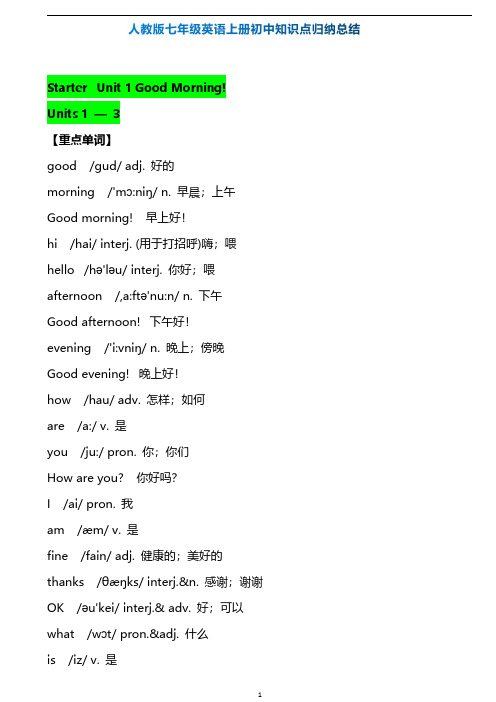
Starter Unit1Good Morning! Units1—3【重点单词】good/gud/adj.好的morning/'mɔ:niŋ/n.早晨;上午Good morning!早上好!hi/hai/interj.(用于打招呼)嗨;喂hello/hə'ləu/interj.你好;喂afternoon/,a:ftə'nu:n/n.下午Good afternoon!下午好!evening/'i:vniŋ/n.晚上;傍晚Good evening!晚上好!how/hau/adv.怎样;如何are/a:/v.是you/ju:/pron.你;你们How are you?你好吗?I/ai/pron.我am/æm/v.是fine/fain/adj.健康的;美好的thanks/θæŋks/interj.&n.感谢;谢谢OK/əu'kei/interj.&adv.好;可以what/wɔt/pron.&adj.什么is/iz/v.是this/ðis/pron.这;这个in/in/prep.(表示使用语言、材料等)用;以English/'iŋgliʃ/n.英语adj.英格兰的;英语的in English用英语map/mæp/n.地图cup/kʌp/n.杯子ruler/'ru:lə/n.尺;直尺pen/pen/n.笔;钢笔orange/'ɔrindʒ/n.橙子jacket/'dʒækit/n.夹克衫;短上衣key/ki:/n.钥匙quilt/kwilt/n.被子;床罩it/it/pron.它a/ə/art.(用于单数可数名词前)一(人、事、物) that/ðæt/pron.那;那个spell/spel/v.用字母拼;拼写please/pli:z/interj.(用于客气地请求或吩咐)请color/'kʌlə/n.(=colour)颜色red/red/adj.&n.红色(的)yellow/'jeləu/adj.&n.黄色(的)green/gri:n/adj.&n.绿色(的)blue/blu:/adj.&n.蓝色(的)black/blæk/adj.&n.黑色(的)white/wait/adj.&n.白色(的)purple/'pə:pl/adj.&n.紫色(的)brown/braun/adj.&n.棕色(的);褐色(的)the/ði;ðə/art.指已提到或易领会到的人或事now/nau/adv.现在;目前see/si:/v.理解;明白can/kæn/modal v.能;会say/sei/v.说;讲my/mai/pron.我的知识点:1.短语归纳:good morning早上好good afternoon下午好good evening晚上好name list名单an English name英文名字2.必背典句:(1)Good morning,Alice!早上好,艾丽斯!(2)Good afternoon!下午好!(3)Hi,Bob!你好,鲍勃!(4)Hello,Frank!你好,弗兰克!(5)Good evening晚上好!(6)—How are you?你好吗?—I’m fine,thanks.How are you?我很好,谢谢。
中学生用英语怎么说
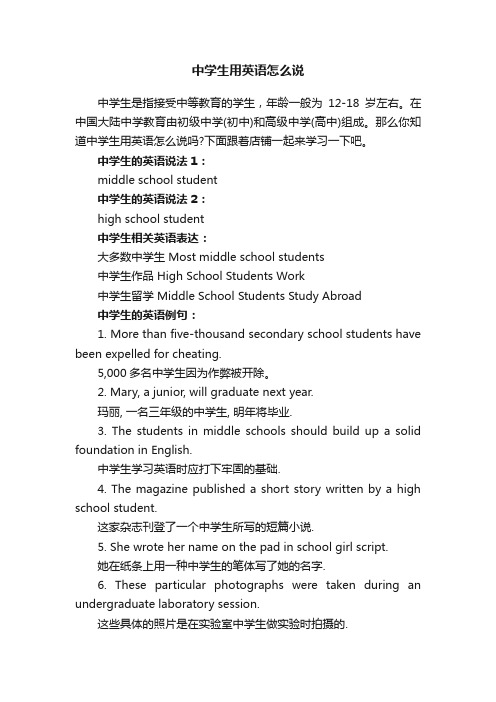
中学生用英语怎么说中学生是指接受中等教育的学生,年龄一般为12-18岁左右。
在中国大陆中学教育由初级中学(初中)和高级中学(高中)组成。
那么你知道中学生用英语怎么说吗?下面跟着店铺一起来学习一下吧。
中学生的英语说法1:middle school student中学生的英语说法2:high school student中学生相关英语表达:大多数中学生 Most middle school students中学生作品 High School Students Work中学生留学 Middle School Students Study Abroad中学生的英语例句:1. More than five-thousand secondary school students have been expelled for cheating.5,000多名中学生因为作弊被开除。
2. Mary, a junior, will graduate next year.玛丽, 一名三年级的中学生, 明年将毕业.3. The students in middle schools should build up a solid foundation in English.中学生学习英语时应打下牢固的基础.4. The magazine published a short story written by a high school student.这家杂志刊登了一个中学生所写的短篇小说.5. She wrote her name on the pad in school girl script.她在纸条上用一种中学生的笔体写了她的名字.6. These particular photographs were taken during an undergraduate laboratory session.这些具体的照片是在实验室中学生做实验时拍摄的.7. Middle school students in China are forbidden to smoke.在中国不许中学生抽烟.8. The paper which the student receives in high school is a diploma.中学生得到的证书叫文凭.9. This shows clearly in the remarks of a group of high - school students near Los Angeles.这一点从洛杉矶附近的一群中学生的言谈中,清楚地表现出来了.10. China hat Britta Heidemann seit ihrem Sch ü leraustausch nicht mehr losgelassen.中学生交流活动后她同中国结下不解之缘.11. I was a secondary school student, I am very sympathetic to you!我是一名中学生, 我非常同情你们!12. Basically middle - school and college students during the Cultural Revolution Chairmanact as revolutionaries.在“”时期,几乎所有的中学生和大学生都是革命的“红卫兵”.13. Should sports classes be sacrificed in High School so students Academic subjects?您赞成牺牲中学生的在校运动课程,以转移至主科得课程吗 ?14. Going steady is not suitable for middle school students.中学生不宜与一个固定异性约会.15. The campaign against amphetamine will include spot checks on high school students.反对安非他命的活动将包括对中学生的抽查.中学生用英语怎么说中学生是指接受中等教育的学生,年龄一般为12-18岁左右。
- 1、下载文档前请自行甄别文档内容的完整性,平台不提供额外的编辑、内容补充、找答案等附加服务。
- 2、"仅部分预览"的文档,不可在线预览部分如存在完整性等问题,可反馈申请退款(可完整预览的文档不适用该条件!)。
- 3、如文档侵犯您的权益,请联系客服反馈,我们会尽快为您处理(人工客服工作时间:9:00-18:30)。
初中英语怎么说
初中:junior middle school;junior high school;
例句:
1. 勒芒的一所初中被烧成灰烬。
In le mans, a junior high school was burned to a cinder.
2. 初中或以上学历,电子类技校优先。
Junior middle school or above, technical school with major in electronics is preferred.
3. 看护儿童是很多在初中的女孩经历的习俗。
Babysitting is a rite of passage for many girls in junior high school.
4. 他7岁开始学习相声,未完成初中学业。
He started studying cross talk at age 7 and never finished junior high school.
5. 她和圣布里吉德小学初中高中的工作人员一起努力,组成了家庭作业委员会。
Working with the staff at st brigid elementary junior high school, she formed a homewo rk committee.
6. 从长期来看,更严重的问题是初中以上的教育成本对于很多家庭来说是难以承受的。
Over the long term, the bigger problem is that education beyond junior high school is fi nancially out of reach to manyfamilies.
7. 读初中时去郊游,全班同学都没有带伞,全部被突如其来的暴雨浇透。
Reading of the junior high school to go for an outing, class had no umbrella, all be co me unexpectedly heavy raindrenched.
8. 现在很多农村当地的年轻人,他们常常是还没有获得初中的教育,但是却被教导要学习
使用电脑。
Local youngsters from rural homes, with often no more than a junior high school educ ation, are being taught to usecomputers.
9. 我过去在初中时收集过邮票,
I used to collect stamps when I was in junior middle school.
10. 很多乡村医生初中都没有毕业。
Many village doctors did not make it past junior high school.
11. 从我们初中毕业到现在,已有好一段时间了。
It's been a long time since we left our junior middle school.
12. 懵懂而无忧虑的初中生活。
会让你的人生进一步的丰富起来。
But ignorant not anxious junior middle school life. Can further let your life enrich.。
